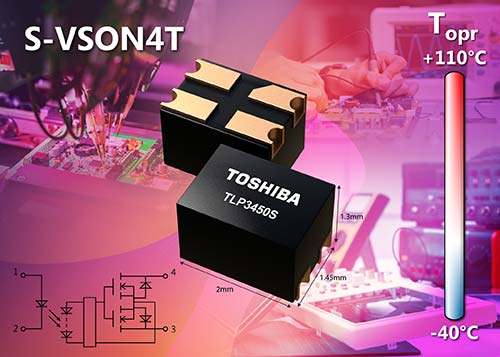 Toshiba Electronics Europe GmbH (“Toshiba”) has released a new low voltage, high-speed photorelay. Particularly suitable for the pin electronics of semiconductor testers, the TLP3450S makes measuring devices-under-test (DUTs) at fast speeds more precise. It is also suited for use in probe cards, measuring instruments and a wide variety of industrial equipment.
Toshiba Electronics Europe GmbH (“Toshiba”) has released a new low voltage, high-speed photorelay. Particularly suitable for the pin electronics of semiconductor testers, the TLP3450S makes measuring devices-under-test (DUTs) at fast speeds more precise. It is also suited for use in probe cards, measuring instruments and a wide variety of industrial equipment.
The new TLP3450S is based upon an upgraded internal configuration with enhanced infrared LEDs coupled to photodiode arrays that have an optimised design. As a result, the turn-on switching time (tON) of the new device is below 80μs. Compared to the previous generation (TLP3450), this represents a 40% improvement, which will significantly benefit the overall throughput of the ATE system.
The TLP3450S has a smaller output capacitance (COFF) of just 0.6pF, which reduces high-frequency signal leakage when the output is turned off – this will reduce the noise and improve the accuracy of multiplexing structures. The device also has a lower on-resistance (RON) – typically 6.8Ω) that improves signal attenuation when the output is in ON state.
The TLP3450S has an input-output isolation (BVs) rating of 500Vrms and is able to operate in ambient temperatures in the range of -40°C to +110°C. It is configured as a form A contact device and is capable of sourcing 160mA (ION) continuously. The pulsed rating is 480mA (IONP).
Complex ATE systems require small components to improve the mounting density. To achieve this, the TLP3450S is housed in a tiny S-VSON4T package measuring just 1.45mm × 2.0mm × 1.3mm – an 18% reduction in footprint when compared to conventional products.
Find out more about the new TLP3450S photorelay on Toshiba’s website: https://toshiba.semicon-storage.com/eu/semiconductor/product/isolators-solid-state-relays/photorelay-mosfet-output/detail.TLP3450S.html


